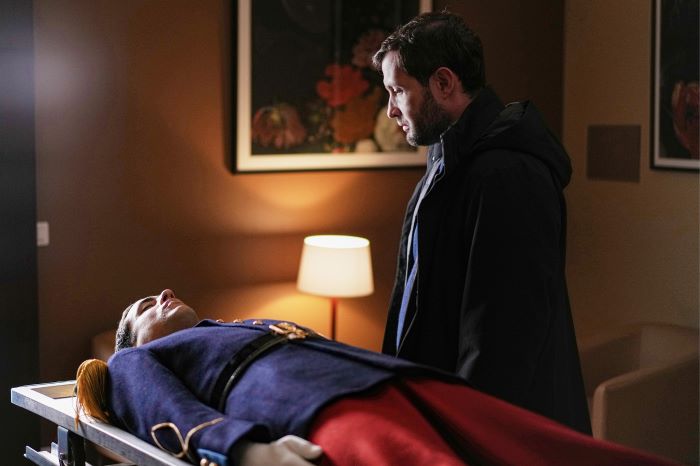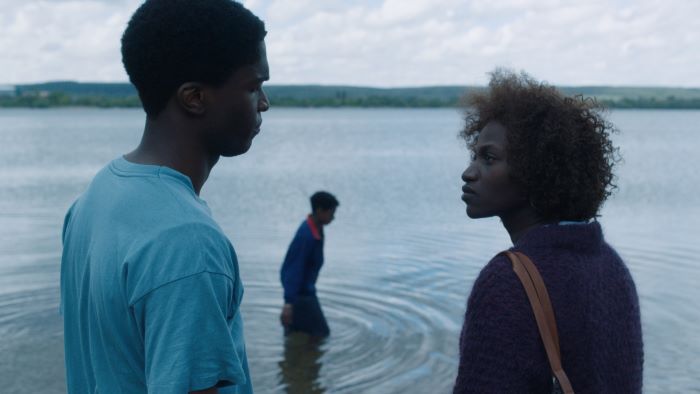Post-colonial fallout reverberates through several strong films at the 2023 edition of Rendez-Vous with French Cinema, presented by Unifrance and New York’s Film at Lincoln Center. Although having ended more than 60 years ago, France’s colonial reign in Algeria continues to shape—and warp—destinies and relationships for its former subjects.For My CountryFormal elegance and deep emotional impact are a tough combination to achieve in a film, but For My Country hits the mark. This restrained and ambitious work takes multiple powerful themes and memorably integrates them all into something greater than the aggregate of parts. Apparently, the story is derived from a real-life tragic experience of director Rachid Hami, and proceeds with hard-earned sorrow and wisdom. The plot point from which much of the movie arises is the hazing death of Aïssa (Shaïn Boumedine), a rising cadet of Algerian origin at France’s primary military academy, Saint Cyr. From this disaster proceeds the saga of his immigrant mother and older brother’s attempts to find out the truth behind the death and to demand a suitable burial from the rigid, possibly racist French military apparatus. From its initial shock, For My Country reveals the wrenching backstory of domestic abuse that drove the siblings apart and propelled the family from 1990s Algeria to France in pursuit of happiness—a happiness that was not to be. The film also goes back in time to explore the relationship between the now-dead Francophile military man Aïssa and his ne’er-do-well older brother Ismaël (Karim Leklou). Empathetic writing and precise acting strongly define their characters. Aïssa, the charismatic golden boy, pursues glory as a soldier and an Algerian, while lonely Ismaël conceals a great deal of pain and need for love under a goofy, class-clown exterior.
Each of these strands would be challenging to develop on their own, but Hami does all of them honor and relates them to each other skillfully. In its critique of French institutions, the pursuit-of-justice portion of the film recalls the highly praised Saint Omer, only less lofty and talky. The Algerian backstory packs a stripped-down punch, while the return of a haunting figure from the Maghreb underscores the difficulty of ever really escaping the past. And the wary relationship between the two very dissimilar brothers achieves a poignancy and a fish-out-of-water charm when they reunite in Taiwan, a beautifully shot and surreal setting that stands apart from the rest of the movie but somehow fits perfectly. All the characters, including the men’s resolute mother (Lubna Azabal), interact credibly with each other and with outsiders as the story inches toward a resolution of sorts.
Beneath its overhang of tragedy, For My Country ends on a note of hope. Cherish your memories, it seems to say, and show people you love them while you can—a message to heed.
Mother and Son
Another unhappy immigrant family story takes place in Mother and Son from director Léonor Serraille, only this time unfolding in a freewheeling quasi-documentary style that packs more punch than first impressions suggest. Rose (Annabelle Lengronne) arrives in the Paris suburbs from Côte d’Ivoire as a single parent of two little boys, Jean and Ernest. The film starts with Rose’s restless perspective, then dwells on the elder son, who can’t fulfill his initial promise. Lastly, the focus shifts to the younger boy, now grown up and living with the silent hurt of abandonment by the older two. In Rose, Serraille has created a complex character: witty but withholding; drawn to bright lights and music, but apt to hide out, smoking cigarettes on Paris rooftops in wide shots that emphasize her solitude; tempting to men, but choosing the wrong ones; fiercely ambitious for her children, but prone to bolt when a possible lover comes into view. Rose’s choice to uproot the family from Paris to the smaller town (and whiter) town of Rouen in pursuit of a lover unmoors her older son Jean (Stéphane Bak). The smart, driven teen stops studying, loses his White girlfriend, and breaks down in a series of upsetting confrontations where he turns on his mother and, more sadly, his cherished younger brother Ernest. The movie’s final scenes represent a reckoning between mother and this now-grown youngest son, uneasily reunited after years of estrangement. What happened to this family? So much remains unspoken. Indeed, Mother and Son makes a point of not revealing too much. The camera seems to spy on the characters, sometimes interposing objects that obscure their faces and actions (a sweetly amorous scene between Jean and his girlfriend under a tree is teasingly filmed between swaying tree branches whose undulations feel like a warning). The movie’s deceptively loose, offhand air makes the point that neglect and carelessness ruin relationships more surely than heavily dramatic scenes do.
Like For My Country, Mother and Son alludes to French racism, but that’s not really the point here. The real focus is on the family dynamic. Like all observers of other people’s families, we can never really understand what goes on within. We suspect that the members of this family can’t really pinpoint where things began to go so wrong either. Still, the somber Mother and Son offers a faint hope of reconnection in its final moments. If loved ones go out through a door, maybe they can come back the same way. Just leave it open as long as you can.
HARKIS1960s French colonial Algeria is the backdrop for Philippe Faucon’s Harkis. So is French treachery in this terse, borderline dry tale of betrayal by France of its wartime Algerian allies. Faced with a bloody uprising in the colony it had ruled for over 130 years, France recruited thousands of often destitute, desperate Algerians, known as harkis, to help suppress the Algerian revolution from the 1950s through the early 1960s. The troops were promised money and—more important—a safe passage to France on victory day. Once France realized it was on its way out for good, the promises were swiftly withdrawn and the harkis abandoned to a population that hated them and targeted them for death. The film’s postscript adds that between 35,000 and 80,000 harki soldiers were killed after the war.
Harkis tells this bleak story with severe economy, depicting the unfortunate Algerians going through cursory training, rounding up dirt-poor and resentful villagers, and being forced to shoot passers-by whose identities they don’t know. Desertion is common. Torture and beatings of suspected enemy combatants take place routinely, and are filmed straightforwardly as if without comment. The platoon’s field commander, a Frenchman (Théo Cholbi), seems half-aware in the back of his mind that the assurances he provides his men raise expectations that can never be met. Any hopes he harbors of honoring his promises are dashed by his captain, a prime example of haughty French officialdom issuing prohibitions in unbending bureaucratic language. (Some things in life never change.)Photographed in dusty, impoverished desert landscapes, Harkis feels like a darker, harsher version of Catch-22, exposing the futility of war and the misuse of military power both against enemies and within the ranks. This laconic film doesn’t lay its indictments on too hard, and it doesn’t need to. They are damning enough without embellishment.



















Leave A Comment